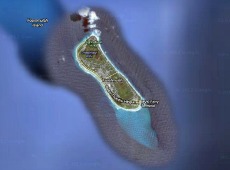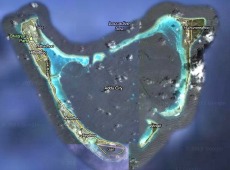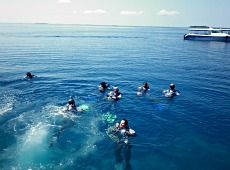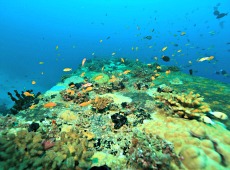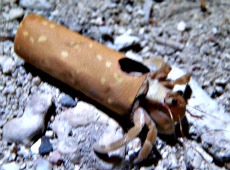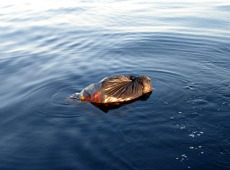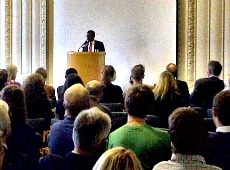The Burunu Shikaaru Bodyboarding Challenge, the first event of the Maldives Bodyboarding Association (MBBA), concluded in Male’ yesterday with big surf and competitors in high spirits.
The newly formed MBBA began this aptly named event – in Dhivehi, ‘burunu’ means a constellation that indicates the southwest monsoon and the best season for surfing, while ‘shikaaru’ is to hunt – on May 2.
What was originally planned to take three days stretched into nearly a week and a half of postponements and rescheduling with swells at Male’s surf area ‘Raalhugandu’ only reaching about a foot.
However, after a week of severe thunderstorms across the island-nation the five foot swells at yesterday’s (May 11) final provided competitors with the strong, hollow waves they were hunting for.
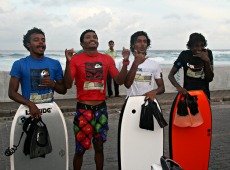 Ali ‘Kuda Ayya’ Khushruwan, founder of MBBA, won first place and MVR 10,000 (US$648). The competition’s youngest bodyboarder, 16 year-old Ali ‘Shaam’ Raafiu, finished a close second scoring only half a point less, and walked away with MVR 5,000 (US$324). Third place and MVR 2,500 (US$162) went to Ali ‘JD’ Javid, while Ijazulla ‘Ija’ Shareef took home the ‘rookie’ award.
Ali ‘Kuda Ayya’ Khushruwan, founder of MBBA, won first place and MVR 10,000 (US$648). The competition’s youngest bodyboarder, 16 year-old Ali ‘Shaam’ Raafiu, finished a close second scoring only half a point less, and walked away with MVR 5,000 (US$324). Third place and MVR 2,500 (US$162) went to Ali ‘JD’ Javid, while Ijazulla ‘Ija’ Shareef took home the ‘rookie’ award.
“I didn’t know this would happen. I thought you know it’s really competitive, I didn’t expect this. Today it was really good, really strong and nice waves. Overall [my performance] was pretty good, but in the final I got really panicked because I didn’t get really good waves. I thought I’d place second. I’m really shocked,” MBBA founder and competition winner Ali ‘Kuda Ayya’ Khushruwan told Minivan News.
“I also didn’t know that my dad competed. The first day I told him don’t go, it’s going to be really big,” said Kuda Ayya. “It’s really nice, crazy, everyone came here to support me. I didn’t know that everyone would come, my friends and family, everyone was supporting [wearing ‘Kuda Ayya’ t-shirts],” he gushed.
Second and third place winners Shaam and JD were beaming after their performance in the final and craving the next competition.
“Waves today were really good. We didn’t think we’d get this size of waves. At the beginning [of the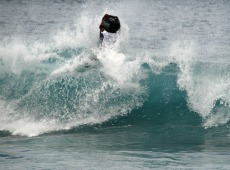 competition] it was good, but the waves were awesome for the final,” Shaam told Minivan News.
competition] it was good, but the waves were awesome for the final,” Shaam told Minivan News.
“It was very heavy and shallow, with a strong current and backwash. All the conditions are very difficult because this area is closed,” JD told Minivan News.
Both Sham and JD are “trying for first place the next time” and explained that competition is always a friendly amongst the Maldivian bodyboarders because “it’s a very close knit group”.
Kuda Ayya is also excited to compete in the for the next MBBA competition, planned to take place in June on Villingili Island, which neighbors Male’.
“It’s going to be good, really fun, it’s really hollow and really shallow. We have to be really careful, but it’s competition,” said Kuda Ayya.
Twenty-two bodyboarders faced off over 18 heats, with the best two from each heat automatically advancing to the next round, while the bottom two had a chance to participate in the requalifying rounds. Ultimately, eight bodyboarders advanced to the semi-final and four to the final yesterday.
Rough rides at Raalhugandu
Although regulars make carving the waves at raalhugandu look easy, the reef break is not for the faint of heart.
“If you can surf here, you can surf anywhere in the Maldives,” a local surfer explained.
Bodyboarders had to contend with a reef break plagued by strong currents, rip tides, backwash, a very shallow reef, all in an area less than a kilometer wide.
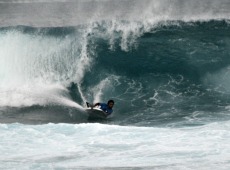 “You have to be very careful. It’s really hard to learn here [at raalhugandu], because it’s a reef break and really shallow – waist high where the waves break,” said Kuda Ayya.
“You have to be very careful. It’s really hard to learn here [at raalhugandu], because it’s a reef break and really shallow – waist high where the waves break,” said Kuda Ayya.
“This break is pretty, it’s like when it’s big, it’s really good for bodyboarders, the waves are really strong and hollow. We need a critical, strong lip for maneuvers – like backflips which are my favorite,” Kuda Ayya explained. “But it’s a really small space.”
“In 2000 the artificial beach was made, that’s why it’s really small. Previously we had really long waves. It was really good spot in the 1980’s and 1990’s but what to do,” he lamented. “[Now] it’s really bad. I think the bodyboarding and surfing community is really small, that’s why they [the government] didn’t care and they did this.”
Although Raalhugandu can break big, after Kuda Ayya’s first round, first heat win earlier this week, he discussed having to compete on small waves.
“The heat went pretty good, the thing is the waves are pretty small [today], but I think it’s going to 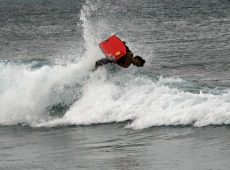 be fine,” Kuda Ayya said. “Actually it’s really hard to take the speed and doing the rolls and things, you have to paddle for the rolls and forward spins. It’s really difficult, but what to do,” Kuda Ayya told Minivan News the first day of competition.
be fine,” Kuda Ayya said. “Actually it’s really hard to take the speed and doing the rolls and things, you have to paddle for the rolls and forward spins. It’s really difficult, but what to do,” Kuda Ayya told Minivan News the first day of competition.
Kuda Ayya is a Male’ local with 12 years of bodyboarding experience, including winning first place in international competitions held in Malaysia and New South Wales, Australia. He took first place in 2012’s Australia’s Senior Men’s Open, competing for the New South Wales team.
Raalhugandu regulars
“The MBBA plans to hold four or five contests yearly,” MBBA Media Coordinator Hassan ‘Rushh’ Rasheed told Minivan News.
“This is the first competition, so I think it’s pretty big. You can see lots of spectators,” he added.
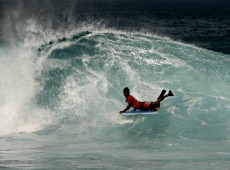 Maldivian bodyboarders and surfers work together closely, especially raalhugandu regulars, and this was evident during the very well organised bodyboarding competition.
Maldivian bodyboarders and surfers work together closely, especially raalhugandu regulars, and this was evident during the very well organised bodyboarding competition.
Five International Surf Association (ISA) certified judges – also local surfers – scored the competition.
“Although the maneuvers are different, the judging criteria is the same,” a competition judge told Minivan News.
“The Maldives Surfing Association (MSA) and MBBA we are together and work together. MSA is the governing body, but I think next year MBBA might change to a bodyboarding governing body,” explained Kuda Ayya.
The Burunu Shikaaru Bodyboarding Challenge was the first event held by the MBBA, which had its first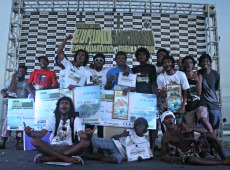 round of elections February 10 and was registered February 11 with 40 new members. To compete in the competition bodyboarders had to be an member of MBBA.
round of elections February 10 and was registered February 11 with 40 new members. To compete in the competition bodyboarders had to be an member of MBBA.
The bodyboarding challenge was sponsored by Sonee Sports, the Tourism Employees Association of the Maldives (TEAM), and travel company, ‘I (heart) Maldives’.
The newly-formed MBBA’s mission is to help local bodyboarders of all ages get started and build a career in the sport. They aim to raise awareness, support, and promote bodyboarding throughout the Maldives.
Given the intimate relationship bodyboarders, and surfers, have with the ocean, the MBBA also plans to organise beach cleaning projects on islands throughout the country with local bodyboarders and surfers.
Joining MBBA only requires MVR 150 (US$10) and an application form, and membership has the bonus perks of a member identification card, event t-shirts, and “hopefully” surf shops and coffee shop discounts.
 (0)Dislikes
(0)Dislikes (0)
(0)